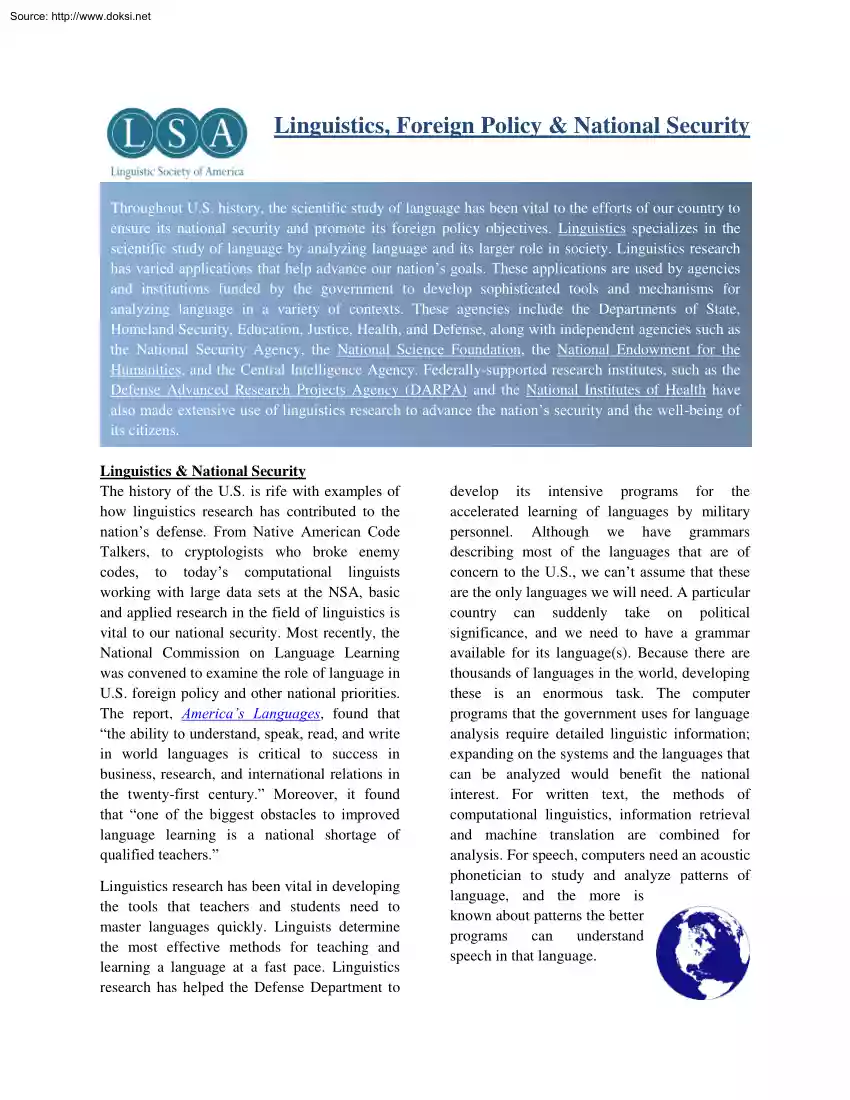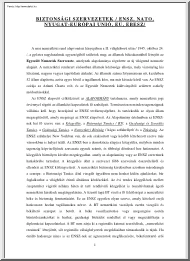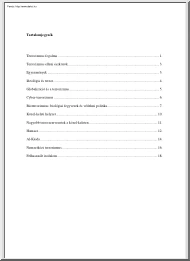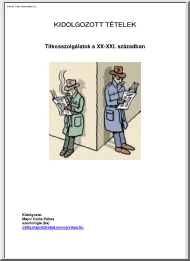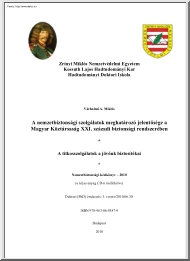Datasheet
Year, pagecount:2017, 3 page(s)
Language:English
Downloads:2
Uploaded:May 10, 2018
Size:771 KB
Institution:
-
Comments:
Linguistic Society of America
Attachment:-
Download in PDF:Please log in!
Comments
No comments yet. You can be the first!Content extract
Source: http://www.doksinet Linguistics, Foreign Policy & National Security Throughout U.S history, the scientific study of language has been vital to the efforts of our country to ensure its national security and promote its foreign policy objectives. Linguistics specializes in the scientific study of language by analyzing language and its larger role in society. Linguistics research has varied applications that help advance our nation’s goals. These applications are used by agencies and institutions funded by the government to develop sophisticated tools and mechanisms for analyzing language in a variety of contexts. These agencies include the Departments of State, Homeland Security, Education, Justice, Health, and Defense, along with independent agencies such as the National Security Agency, the National Science Foundation, the National Endowment for the Humanities, and the Central Intelligence Agency. Federally-supported research institutes, such as the Defense Advanced
Research Projects Agency (DARPA) and the National Institutes of Health have also made extensive use of linguistics research to advance the nation’s security and the well-being of its citizens. Linguistics & National Security The history of the U.S is rife with examples of how linguistics research has contributed to the nation’s defense. From Native American Code Talkers, to cryptologists who broke enemy codes, to today’s computational linguists working with large data sets at the NSA, basic and applied research in the field of linguistics is vital to our national security. Most recently, the National Commission on Language Learning was convened to examine the role of language in U.S foreign policy and other national priorities The report, America’s Languages, found that “the ability to understand, speak, read, and write in world languages is critical to success in business, research, and international relations in the twenty-first century.” Moreover, it found that
“one of the biggest obstacles to improved language learning is a national shortage of qualified teachers.” Linguistics research has been vital in developing the tools that teachers and students need to master languages quickly. Linguists determine the most effective methods for teaching and learning a language at a fast pace. Linguistics research has helped the Defense Department to develop its intensive programs for the accelerated learning of languages by military personnel. Although we have grammars describing most of the languages that are of concern to the U.S, we can’t assume that these are the only languages we will need. A particular country can suddenly take on political significance, and we need to have a grammar available for its language(s). Because there are thousands of languages in the world, developing these is an enormous task. The computer programs that the government uses for language analysis require detailed linguistic information; expanding on the systems
and the languages that can be analyzed would benefit the national interest. For written text, the methods of computational linguistics, information retrieval and machine translation are combined for analysis. For speech, computers need an acoustic phonetician to study and analyze patterns of language, and the more is known about patterns the better programs can understand speech in that language. Source: http://www.doksinet Language Specialists & Linguists: Partners in National Security The U.S government relies on linguists for its expertise in communications intelligence – that is, the collection and transmission of information that is important for national security. Our countrys messages must reach their destinations without being intercepted and understood by any other country; at the same time, we want to interpret any messages that we intercept from other countries concerning espionage, military build-ups, or other activities that could threaten the United States. For
this reason, the government hires language specialists to translate, analyze, and summarize intercepted messages. The grammars and methods are the products of research conducted by language scientists with advanced degrees in linguistics. Learning in School Working for the Government Dozens of linguists were hired for the U.S Army in 1943 to help decode Soviet messages. The analysis concluded that the messages were intended for Soviet spies, some of whom were working in the federal government. In 1962, when linguists decoded Soviet messages to ships carrying military supplies to Cuba, the analysis informed the government before the nuclear sites were fully developed. In the first World War, the Native American Code Talkers discovered that German troops were listening in to U.S conversations, and in the second they confused enemy troops trying to listen in on the U.S Improve U.S National Security Smarter and Safer World! Linguistics & Federal Agencies Congress, the Departments
of State and Defense, and the FBI have reported that they have a limited number of adequately trained personnel in language and linguistics. By 2012 the FBI had 1,400 linguists and has recently increased positions that require a language background by 85%, while the State Department increased their linguistic personnel by 15%. America’s Languages reports that to fill these positions we also must emphasize language at a young age; primary and secondary schools should integrate language in curricula. Important to note is the distinction in federal agencies between a linguist and a language expert. Linguists develop tools to work with language, while language experts are individuals competent in a language other than English. Federal Funding for Linguistic Research There are several programs, grants, and agencies in place that emphasize research in linguistics. These include Fulbright-Hays and DARPA. Fulbright-Hays enables universities to grant doctoral students funds to complete
research abroad in foreign or endangered languages for up to a year. DARPA has launched the LORELEI project, to “advance the state of computational linguistics and human language technology to enable rapid, low-cost development of capabilities for low-resource languages” and has given grants to linguists and universities to help complete the project. – Brief written by Julia McNicholas, with Betty Birner and Alyson Reed – – Linguistic Society of America – 522 21st St., NW, Suite 120, Washington DC 20006 – 2028351714 – www.linguisticsocietyorg Source: http://www.doksinet Additional Resources and Links Linguistics as a profession https://www.linguisticsocietyorg/resource/linguistics-profession The Science of Linguistics https://www.linguisticsocietyorg/resource/science-linguistics Why Major in Linguistics? https://www.linguisticsocietyorg/content/why-major-linguistics Linguistics in Everyday Life https://www.linguisticsocietyorg/content/linguistics-everyday-life
Policy Alert: 2017 Budget Deal Gives Science Funding a Boost https://www.linguisticsocietyorg/news/2017/05/02/policy-alert-2017-budget-deal-givesscience-funding-boost 2017 Federal Budget Proposals: Implications for Language and Linguistics https://www.linguisticsocietyorg/news/2017/05/23/trump-budget-proposal-fy18implications-linguistics-and-language The Washington Post, NEH Grant Finds Unknown Copy of the Declaration of Independence https://www.washingtonpostcom/opinions/thanks-to-this-agency-we-found-an-unknowncopy-of-the-declaration-of-independence/2017/05/03/1d6e7dce-2f88-11e7-9dec764dc781686f storyhtml?utm term=08b9f03981a6 – Linguistic Society of America – 522 21st St., NW, Suite 120, Washington DC 20006 – 2028351714 – www.linguisticsocietyorg
Research Projects Agency (DARPA) and the National Institutes of Health have also made extensive use of linguistics research to advance the nation’s security and the well-being of its citizens. Linguistics & National Security The history of the U.S is rife with examples of how linguistics research has contributed to the nation’s defense. From Native American Code Talkers, to cryptologists who broke enemy codes, to today’s computational linguists working with large data sets at the NSA, basic and applied research in the field of linguistics is vital to our national security. Most recently, the National Commission on Language Learning was convened to examine the role of language in U.S foreign policy and other national priorities The report, America’s Languages, found that “the ability to understand, speak, read, and write in world languages is critical to success in business, research, and international relations in the twenty-first century.” Moreover, it found that
“one of the biggest obstacles to improved language learning is a national shortage of qualified teachers.” Linguistics research has been vital in developing the tools that teachers and students need to master languages quickly. Linguists determine the most effective methods for teaching and learning a language at a fast pace. Linguistics research has helped the Defense Department to develop its intensive programs for the accelerated learning of languages by military personnel. Although we have grammars describing most of the languages that are of concern to the U.S, we can’t assume that these are the only languages we will need. A particular country can suddenly take on political significance, and we need to have a grammar available for its language(s). Because there are thousands of languages in the world, developing these is an enormous task. The computer programs that the government uses for language analysis require detailed linguistic information; expanding on the systems
and the languages that can be analyzed would benefit the national interest. For written text, the methods of computational linguistics, information retrieval and machine translation are combined for analysis. For speech, computers need an acoustic phonetician to study and analyze patterns of language, and the more is known about patterns the better programs can understand speech in that language. Source: http://www.doksinet Language Specialists & Linguists: Partners in National Security The U.S government relies on linguists for its expertise in communications intelligence – that is, the collection and transmission of information that is important for national security. Our countrys messages must reach their destinations without being intercepted and understood by any other country; at the same time, we want to interpret any messages that we intercept from other countries concerning espionage, military build-ups, or other activities that could threaten the United States. For
this reason, the government hires language specialists to translate, analyze, and summarize intercepted messages. The grammars and methods are the products of research conducted by language scientists with advanced degrees in linguistics. Learning in School Working for the Government Dozens of linguists were hired for the U.S Army in 1943 to help decode Soviet messages. The analysis concluded that the messages were intended for Soviet spies, some of whom were working in the federal government. In 1962, when linguists decoded Soviet messages to ships carrying military supplies to Cuba, the analysis informed the government before the nuclear sites were fully developed. In the first World War, the Native American Code Talkers discovered that German troops were listening in to U.S conversations, and in the second they confused enemy troops trying to listen in on the U.S Improve U.S National Security Smarter and Safer World! Linguistics & Federal Agencies Congress, the Departments
of State and Defense, and the FBI have reported that they have a limited number of adequately trained personnel in language and linguistics. By 2012 the FBI had 1,400 linguists and has recently increased positions that require a language background by 85%, while the State Department increased their linguistic personnel by 15%. America’s Languages reports that to fill these positions we also must emphasize language at a young age; primary and secondary schools should integrate language in curricula. Important to note is the distinction in federal agencies between a linguist and a language expert. Linguists develop tools to work with language, while language experts are individuals competent in a language other than English. Federal Funding for Linguistic Research There are several programs, grants, and agencies in place that emphasize research in linguistics. These include Fulbright-Hays and DARPA. Fulbright-Hays enables universities to grant doctoral students funds to complete
research abroad in foreign or endangered languages for up to a year. DARPA has launched the LORELEI project, to “advance the state of computational linguistics and human language technology to enable rapid, low-cost development of capabilities for low-resource languages” and has given grants to linguists and universities to help complete the project. – Brief written by Julia McNicholas, with Betty Birner and Alyson Reed – – Linguistic Society of America – 522 21st St., NW, Suite 120, Washington DC 20006 – 2028351714 – www.linguisticsocietyorg Source: http://www.doksinet Additional Resources and Links Linguistics as a profession https://www.linguisticsocietyorg/resource/linguistics-profession The Science of Linguistics https://www.linguisticsocietyorg/resource/science-linguistics Why Major in Linguistics? https://www.linguisticsocietyorg/content/why-major-linguistics Linguistics in Everyday Life https://www.linguisticsocietyorg/content/linguistics-everyday-life
Policy Alert: 2017 Budget Deal Gives Science Funding a Boost https://www.linguisticsocietyorg/news/2017/05/02/policy-alert-2017-budget-deal-givesscience-funding-boost 2017 Federal Budget Proposals: Implications for Language and Linguistics https://www.linguisticsocietyorg/news/2017/05/23/trump-budget-proposal-fy18implications-linguistics-and-language The Washington Post, NEH Grant Finds Unknown Copy of the Declaration of Independence https://www.washingtonpostcom/opinions/thanks-to-this-agency-we-found-an-unknowncopy-of-the-declaration-of-independence/2017/05/03/1d6e7dce-2f88-11e7-9dec764dc781686f storyhtml?utm term=08b9f03981a6 – Linguistic Society of America – 522 21st St., NW, Suite 120, Washington DC 20006 – 2028351714 – www.linguisticsocietyorg
